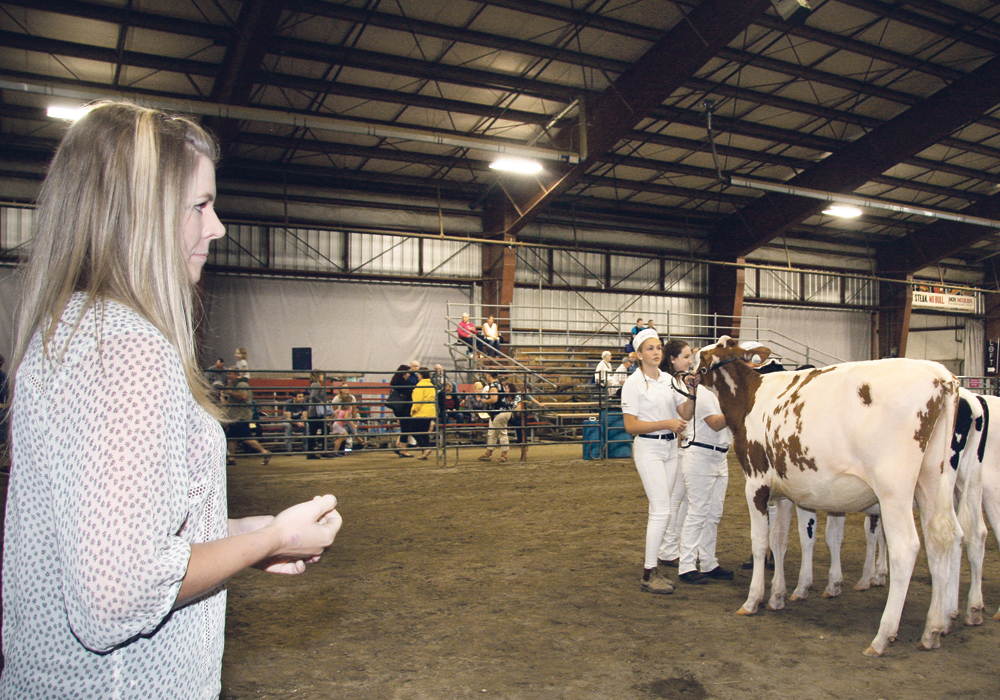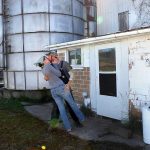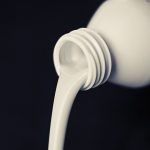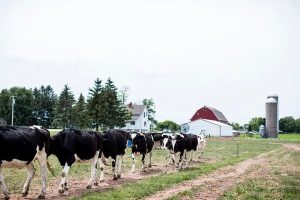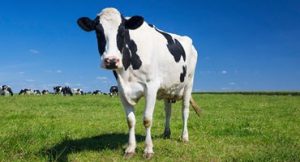
Running a dairy farm in the Lower Mainland of British Columbia could be like sleeping next to an elephant named Vancouver.
Located at Delta, B.C., Martiann Holsteins was started by Martin and Ann Hamming in 1974. Perry and Angela Hamming and their daughter Lorna followed in their footsteps.
The property is a showplace in the flatlands of the Delta area but life is changing as more people move into the area and nudge out farmers.
For those who want to farm, urban encroachment, labour shortages, new environmental requirements and land prices make life a daily challenge.
“A big challenge is the price of land. Expansion is virtually impossible and the price of renting land is getting higher and higher,” said Angela.
Her family had a nearby dairy farm milking Jerseys. There were once seven dairies in the immediate vicinity, but the Hammings are the only ones left.
Land is being taken over for development or other uses like blueberries and cranberries. There were once more vegetable farms but that land is now growing silage corn for dairy cattle.
The farm is 20 minutes from Vancouver and even in the country, traffic can be nerve wracking. Hammings rent land in different locations and have an off-site heifer farm so getting tractors to different properties means joining the traffic.
Like most modern farms, everyone works. They milk about 200 cows and Lorna is a milker and supervises some of the staff. She and Angela also look after the calves and Perry oversees the entire operation. Their son, Jordan, is becoming a mechanic and lives in nearby Langley.
A cousin and a foreign worker help get the work done, but they have been trying to get another person from India.
“Labour is a huge issue and that is one of the things that is holding us back from expansion. We can’t expand in another area and let the rest of the farm suffer,” said Angela.
Foreign workers have a two-year contract that has to be renewed but everyone would prefer something more permanent.
“It doesn’t make sense for farmers to have to constantly have that kind of turnover,” she said. They understand the need to offer work to Canadians but no one seems interested.
Being in the middle of an urban environment has encouraged them to open their farm to tours to show where milk comes from and how they take care of the environment. In addition they are investigating their own processing unit on the farm to sell their own brand of milk, ice cream and yogurt. If they can find more staff, Lorna would have time to pursue the idea because for her, it the only way to expand without finding more land.
“We are in such a good location for it. We are 20 minutes from Vancouver,” Lorna said.
She attended the University of Fraser Valley’s agriculture program and University of Guelph to learn ice cream making. She has won a number of scholarships through 4-H to pay for part of her schooling and today she gives back by judging and helping at dairy shows.
The family has also kept up with technology.
“We are constantly investing in the farm and trying to keep things up and using technology where we can,” said Angela.
Added Lorna: “We have become more efficient.”
They expanded the milking parlour to handle 28 cows for the 4 a.m. and 3:30 p.m. milkings.
The calf barn was changed so that the youngsters are placed in pairs when they are three weeks old, rather than live in hutches. They have noticed as the calves mature, they keep that friend.
A nearby farmer picks up bull calves weekly. She feeds them until they reach 500 pounds and then sells them on to Alberta for finishing for beef.
Recently, the Hammings have bred some of their Holsteins to beef bulls for crossbred calves. They have used Angus semen and this year tried Speckle Park to see how they might perform.
Cow comfort is a primary goal. The farm was once a tie-stall operation but now the cows are free to move about.
Delta days can get hot and humid, so they installed a row of fans overhead in the stall area to circulate the air and keep the animals cool. Curtains on the walls are temperature and weather controlled to open when needed. The cows are healthier and more productive.
They introduced genomic testing for all their females last year because they want to change their cow herd. The idea is to build a herd of A2 cows, which produce a particular type of beta casein, a protein found in milk. It is believed A2 milk is easier to digest.
Genomic testing should make mating decisions easier when combined with phenotypic information.
“If you can identify that in your maternal side and your paternal side and you should be able to stop those traits from carrying on. Health-wise that is huge,” Angela said.
“We have all been skeptical over the years but I think it is proving itself quite nicely.”
Dairies produce plenty of manure and new regulations have been introduced that require more soil tests and specify where it can be spread to protect water sources.
They use sand for bedding and installed a system to recycle the sand and separate the solids, which are mostly fibre. A neighbouring farmer takes that material while they spread liquid manure on their fields.
They were already following strict manure rules under their environmental farm plan and soil tests show they are in nutrient balance. Dry matter growth is measured per acre through the ministry of agriculture.
“I think those environmental rules, if they stay in balance, are a good thing,” said Angela
Dairy farmers also follow comprehensive milk quality, animal welfare and environmental guidelines through an industry-developed program called ProAction.
It meant more paperwork but no real changes to how they manage the cows or the farm. If people have questions about food production, that is probably a good thing, said Lorna.
“I think having people speak up with what they want to eat and being more passionate about ag has been a good thing for the industry,” said Lorna.
“If you do have to make a change those are probably good changes.”
